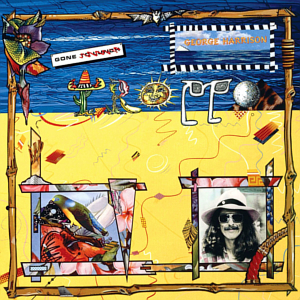
Gone Troppo is the tenth studio album by the English rock musician George Harrison, released on 5 November 1982 by Dark Horse Records. It includes "Wake Up My Love", issued as a single, and "Dream Away", which was the theme song for the 1981 HandMade Films production Time Bandits. Harrison produced the album with Ray Cooper and former Beatles engineer Phil McDonald.
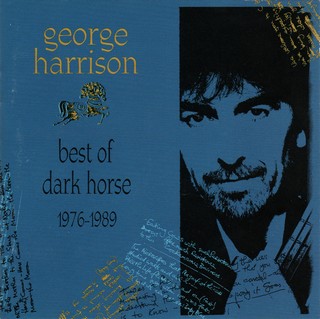
Best of Dark Horse 1976–1989 is a compilation album by British musician George Harrison, released in October 1989. His second compilation, after the Capitol/EMI collection The Best of George Harrison (1976), it contains songs from Harrison's releases on his Dark Horse record label between 1976 and 1987. The album also includes a 1989 single, "Cheer Down", which was Harrison's contribution to the soundtrack of the film Lethal Weapon 2, and two tracks recorded specifically for the collection: "Poor Little Girl" and "Cockamamie Business". Despite the popularity of Harrison's work over this period – both as a solo artist with his Cloud Nine album (1987), and as a member of the Traveling Wilburys – the compilation failed to achieve commercial success.

"What Is Life" is a song by English rock musician George Harrison from his 1970 triple album All Things Must Pass. In many countries, it was issued as the second single from the album, in February 1971, becoming a top-ten hit in the United States, Canada and elsewhere, and topping singles charts in Australia and Switzerland. In the United Kingdom, "What Is Life" appeared as the B-side to "My Sweet Lord", which was the best-selling single there of 1971. Harrison's backing musicians on the song include Eric Clapton and the entire Delaney & Bonnie and Friends band, with whom he had toured during the final months of the Beatles. Harrison co-produced the recording with Phil Spector, whose Wall of Sound production also employed a prominent string arrangement by John Barham and multiple acoustic rhythm guitars, played by Harrison's fellow Apple Records signings Badfinger.

"Crackerbox Palace" is the ninth track on George Harrison's 1976 album, Thirty Three & 1/3. The song was released as the second single from the album and reached number 19 in the American pop charts.

"Letting Go" is a song credited to Paul and Linda McCartney and originally released by Wings on their 1975 album Venus and Mars. The song was remixed and released as a single on 4 October 1975 in the United States, and on 18 October 1975 in the United Kingdom. The song peaked at number 41 in the UK, 41 on the Cash Box Top 100 and number 39 on the Billboard Hot 100.

"Arrow Through Me" is a song by the British–American rock band Wings, released on their 1979 album Back to the Egg.
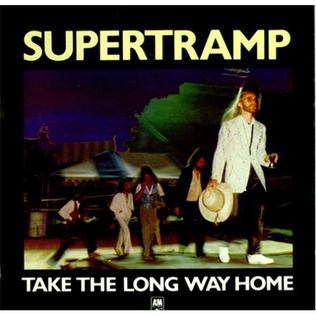
"Take the Long Way Home" is the third US single and sixth track of English rock band Supertramp's 1979 album Breakfast in America. It was the last song written for the album, being penned during the nine-month recording cycle. In 1980, the live version from Paris became a minor hit in various European countries.

"Blow Away" is a song by English musician George Harrison that was released in February 1979 on his album George Harrison. It was also the lead single from the album. The song is one of Harrison's most popular recordings from his solo career and has appeared on the compilations Best of Dark Horse 1976–1989 and Let It Roll: Songs by George Harrison.

"Take It Away" is a single by the English musician Paul McCartney from his third solo studio album Tug of War (1982). The single spent sixteen weeks on the Billboard Hot 100 singles chart, reaching #10 and spending five consecutive weeks at that position. It reached #15 in the UK. The music video, directed by John Makenzie, features former Beatles drummer Ringo Starr and long-time producer George Martin, both of whom played on the track, as well as actor John Hurt and Linda McCartney.

"Gimme Some Truth" is a protest song written and performed by John Lennon. It was first released on his 1971 album Imagine. "Gimme Some Truth" contains various political references emerging from the time it was written, during the latter years of the Vietnam War. Co-produced by Phil Spector, the recording includes a slide guitar solo played by George Harrison, Lennon's former bandmate in the Beatles.
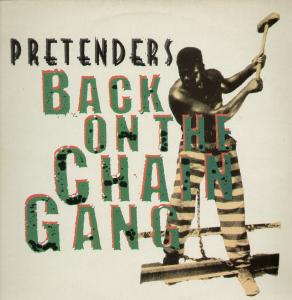
"Back on the Chain Gang" is a song written by American-British musician Chrissie Hynde, originally recorded by her band the Pretenders and released as a single by Sire Records in September 1982. The song was included on The King of Comedy soundtrack album in March 1983 and was later included on the Pretenders' third album, Learning to Crawl, in January 1984.

"Teardrops" is a song by the English rock musician George Harrison from his ninth studio album Somewhere in England (1981). It was also issued as the second single off the album, in July 1981. As with the lead single, "All Those Years Ago", Harrison completed the song after Warner Bros. Records had rejected his initial submission of Somewhere in England in September 1980. In response to Warner's concerns, he wrote "Teardrops" as an attempt at a commercially oriented song.
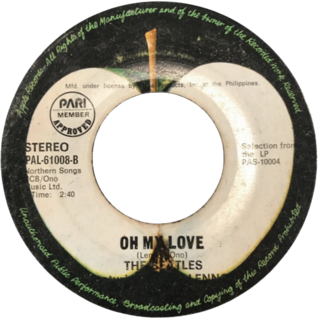
"Oh My Love" is a song written by John Lennon and Yoko Ono that appeared on Lennon's Imagine album in 1971.
"That's the Way It Goes" is a song by English musician George Harrison from his 1982 album Gone Troppo. Harrison wrote the song during a period when he had become uninterested in contemporary music and was enjoying success as a film producer with his company HandMade Films. Partly influenced by his extended holidays in Hawaii and Australia, the lyrics convey his dismay at the world's preoccupation with money and status, although, unlike several of Harrison's previous musical statements on the subject, he expresses resignation and acceptance.

"The Voice" is the second single released from the Moody Blues' 1981 album Long Distance Voyager. The song continued the success of previous single "Gemini Dream", becoming a Top 40 hit on the Billboard Hot 100, where it peaked at No. 15 in October 1981. The song had previously topped the Billboard Top Rock Tracks chart for four weeks during June–July 1981. The song also reached No. 9 in Canada.

"Ride My See-Saw" is a 1968 single by the English progressive rock band the Moody Blues. It was written by the band's bassist John Lodge, and was first released on the Moody Blues' 1968 album In Search of the Lost Chord. It was the second of two singles from that album, the other being "Voices in the Sky".

"Dream Away" is a song by English rock musician George Harrison from his tenth studio album Gone Troppo (1982). The song was featured over the end credits of Harrison's 1981 HandMade Films production Time Bandits, which was director Terry Gilliam's first successful film outside of his work with Monty Python. Aside from the film's orchestral score, it was the only song featured in Time Bandits and was written specifically for the film. "Dream Away" was also issued as a single in Japan in February 1983.
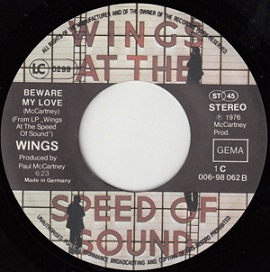
"Beware My Love" is a rock song credited to Paul and Linda McCartney that was first released on the Wings 1976 album Wings at the Speed of Sound. It was also used as the B-side of the single that included "Let 'Em In". A live version recorded on June 7, 1976, in Denver, Colorado, was included on the Wings' album Wings Over America and another live version from three days later in Seattle, Washington, was shown in the concert film Rockshow. An excerpt from the Rockshow performance was also included in the documentary Wings Over the World.
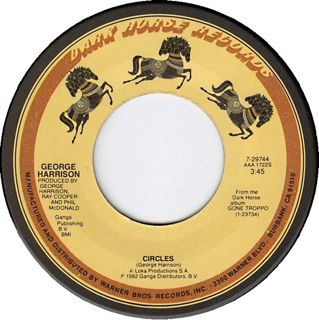
"Circles" is a song by English rock musician George Harrison, released as the final track of his 1982 album Gone Troppo. Harrison wrote the song in India in 1968 while he and the Beatles were studying Transcendental Meditation with Maharishi Mahesh Yogi. The theme of the lyrics is reincarnation. The composition reflects the cyclical aspect of human existence as, according to Hindu doctrine, the soul continues to pass from one life to the next. Although the Beatles never formally recorded it, "Circles" was among the demos the group made at Harrison's Esher home, Kinfauns, in May 1968, while considering material for their double album The Beatles.

"Cloud 9" is a song by English rock musician George Harrison that was released as the opening track of his 1987 album Cloud Nine. It was also issued as a promotional single in the United States, where it peaked at number 9 on Billboard's Album Rock Tracks chart. Co-produced by Jeff Lynne, the recording features guitar interplay between Harrison, on slide guitar, and Eric Clapton. Harrison performed the song in concert throughout his 1991 Japanese tour with Clapton and in 1992. A live version appears on Harrison's Live in Japan album, while the original studio recording was included on his 1989 compilation Best of Dark Horse.



















